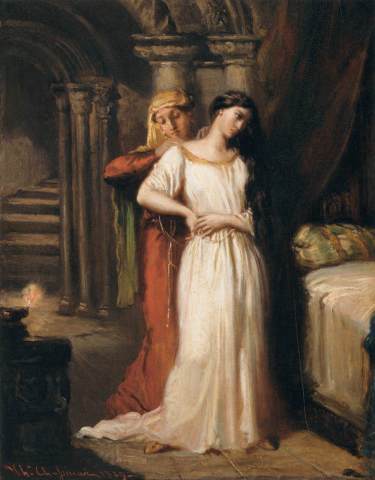This post has been contributed by Haply Eyres. For more on Desdemona, see our other student posts here and here.

‘Writing back’ is the practice of writers from formerly colonized countries remodelling and reimagining texts from the English literary canon in order to express new ideas and the voice of a different culture. Toni Morrison’s Desdemona shifts the focus of William Shakespeare’s Othello from the male protagonist, to his wife and her upbringing by a black African nurse. Anti-colonial struggles ‘restricted the participation of women’ (Young, 361) which often leads to women being almost entirely written out of history. Morrison latches onto this notion and brings the voices of Othello’s women to the forefront, presenting them as human and emotionally complex. As the critic Joe Eldridge Carney points out, Morrison’s retelling imagines both ‘Desdemona’s girlhood as well as her afterlife’ (Carney, n. pag), thereby expanding her life away from the framework of her marriage; Morrison imagines her as a character who is far less constrained by male intervention and forges her own shape instead.
I found the discussion from ‘Being Born a Girl’ to be particularly interesting in its focus on the importance of the back-story in establishing more prominent female characters. Carney suggests that ‘the first strategy that Morrison uses to create a more substantial Desdemona is to allow her a childhood’ (Carney). In developing a childhood for Desdemona, her tragic relationship and her life elicit a greater sense of empathy. Through Desdemona’s dialogue we see her reminiscing about how ‘she [her mother] scolded, for such carelessness… my desires, my imagination must remain hidden’ (Morrison, 17). The denial of ‘imagination’ and ‘desires’ in childhood and the bitter tone in which these are remembered suggest that Desdemona’s fascination and adoration of Othello and Barbary’s (or Sa’ran’s) stories may have grown from a repressed imagination in childhood. Women have more character development and so are not simply extras or representations of minorities, they become people. Desdemona’s actions in the play are given more weight and understanding when set against a backdrop of her childhood.
I felt the focus on female development and Desdemona’s past to be particularly significant given Desdemona’s status as postcolonial literature. It is the nature of women’s struggles in colonized societies to be so marginalized that their history is often not written about or recorded at all (Young, 361). As Carney discusses, Morrison actively objects to the subordinate role of women and the minimal recognition of women from colonized countries, and so writes back to Shakespeare, giving the oppressed wife a voice, the black maid a voice, and giving them a history which otherwise would have been written out.
Works Cited
Young, Robert J C. Postcolonialism: An Historical Introduction. Oxford: Blackwell Publishers, 2001. Print.
Carney, Joe Eldridge. ‘”Being born a girl”: Toni Morrison’s Desdemona.’ New Jersey: Borrowers and Lenders: the Journal of Shakespeare and Appropriation 9.1 (2014): n. pag. Web. <http://www.borrowers.uga.edu/1217/show>.
Links
- Carney’s ‘”Being born a girl”: Toni Morrison’s Desdemona‘.
- Erickson, Peter. ‘Shakespeare and the Process of Appropriation.’ Shakespeare Bulletin 32.4 (2014): 693-95. Web. <http://muse.jhu.edu/journals/shakespeare_bulletin/v032/32.4.erickson.html>.

Pingback: On Carney’s ‘Being Born A Girl’: Toni Morrison’s ‘Desdemona’ – Global Literatures at the University of York
Pingback: Shakespeare’s Use of Racism – Global Literatures at the University of York